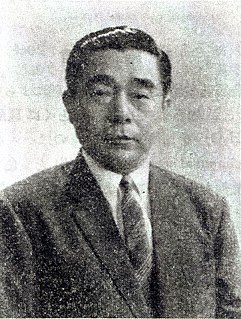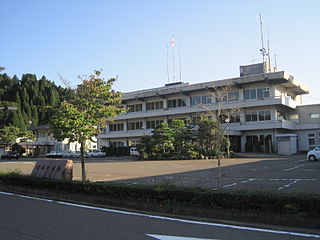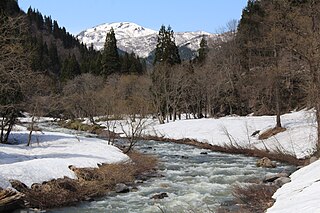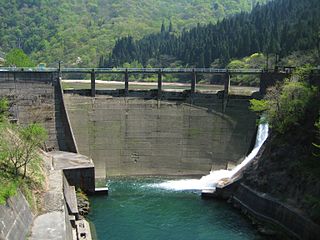
The Chūbu region, Central region, or Central Japan is a region in the middle of Honshū, Japan's main island. In a wide, classical definition, it encompasses nine prefectures (ken): Aichi, Fukui, Gifu, Ishikawa, Nagano, Niigata, Shizuoka, Toyama, and Yamanashi.

Fukui Prefecture is a prefecture of Japan located in the Chūbu region of Honshū. Fukui Prefecture has a population of 778,943 and has a geographic area of 4,190 km2. Fukui Prefecture borders Ishikawa Prefecture to the north, Gifu Prefecture to the east, Shiga Prefecture to the south, and Kyoto Prefecture to the southwest.

Kenichi Fukui was a Japanese chemist, known as the first Asian person to be awarded the Nobel Prize in Chemistry.

Ikeda is a town located in Fukui Prefecture, Japan. As of 1 July 2018, the town had an estimated population of 2,628 in 943 households and the population density of 14 persons per km². The total area of the town was 194.65 square kilometres (75.15 sq mi).

Fukui Station is a railway station in Fukui, Fukui, Japan, operated by West Japan Railway Company and the private railway operator Echizen Railway.

Fukui is the capital city of Fukui Prefecture, Japan. As of 1 July 2018, the city had an estimated population of 264,217, and a population density of 69.2 persons per km2, in 102,935 households. Its total area is 536.41 square kilometres (207.11 sq mi). Most of the population lives in a small central area; the city limits include rural plains, mountainous areas, and suburban sprawl along the Route 8 bypass.

The Itoshiro River is a river through Gifu and Fukui prefectures in Japan.

The Itoshiro Dam is a dam in the city of Ono in Fukui Prefecture, Japan. It was completed in 1968.

The Kuzuryu Dam is a dam in the city of Ōno in the Fukui Prefecture of Japan. The dam supports a 220 MW hydroelectric power station.

Sasogawa Dam is a multi-purpose dam located in the city of Ōno in Fukui Prefecture. Japan. The dam and its reservoir are located within Okuetsu Kōgen Prefectural Natural Park.

The Asuwagawa Dam (足羽川ダム) is a flood-control concrete Arch-gravity dam in the town of Ikeda in Fukui Prefecture, Japan owned by the Japanese Ministry of Land, Infrastructure, Transport and Tourism.

The Futatsuya-Toshuko Dam is a dam in Fukui Prefecture of Japan, completed in 2005.

Kumokawa Dam is a multi-purpose dam located in the city of Ōno in Fukui Prefecture. Japan, completed in 1957.

Managawa Dam is a dam located in the city of Ōno in Fukui Prefecture. Japan.

Masutani Dam is a dam in the town of Minamiechizen, Fukui Prefecture, Japan.

Washi Dam is a hydroelectric power Arch-gravity dam on the Kuzuryū River system in the city of Ōno in Fukui Prefecture, Japan. The dam has a height of 45 meters and is owned by the Electric Power Development Company (J-Power). It is paired with the Nagano Power Station and the Kuzuryu Dam as a Pumped-storage reservoir.

Yanbara Dam is a hydroelectric dam on the Itoshiro River, in the city of Ōno, Fukui prefecture, Japan. It is upriver of the confluence of the Itoshiro River and the larger Kuzuryū River.

Kuzuryūko Station is a JR West railway station in the city of Ōno, Fukui, Japan.

The Hokuriku dialect is a Japanese dialect group spoken in Hokuriku region, consists of northern Fukui Prefecture, Ishikawa Prefecture, Toyama Prefecture, and Sado Island in Niigata Prefecture. Mainland Niigata dialect is classified into Tōkai-Tōsan dialect and Tōhoku dialect and southern Fukui dialect is classified into Kansai dialect.



















